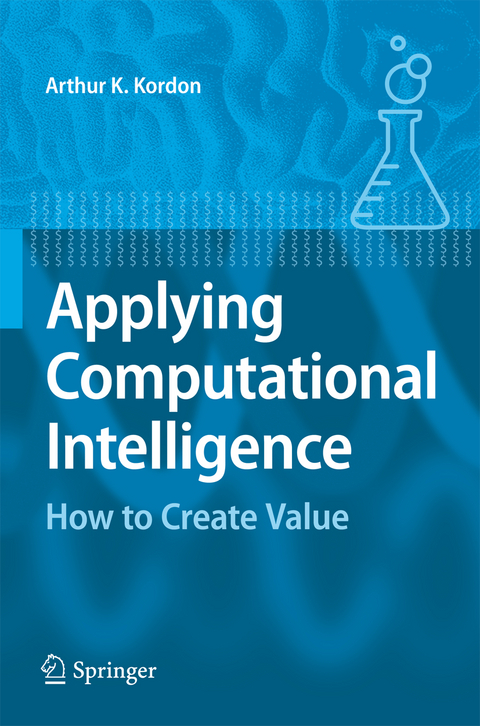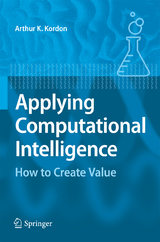Applying Computational Intelligence
Springer Berlin (Verlag)
978-3-540-69910-1 (ISBN)
In theory, there is no difference between theory and practice. But, in practice, there is. Jan L. A. van de Snepscheut The ?ow of academic ideas in the area of computational intelligence has penetrated industry with tremendous speed and persistence. Thousands of applications have proved the practical potential of fuzzy logic, neural networks, evolutionary com- tation, swarm intelligence, and intelligent agents even before their theoretical foundation is completely understood. And the popularity is rising. Some software vendors have pronounced the new machine learning gold rush to "Transfer Data into Gold". New buzzwords like "data mining", "genetic algorithms", and "swarm optimization" have enriched the top executives' vocabulary to make them look more "visionary" for the 21st century. The phrase "fuzzy math" became political jargon after being used by US President George W. Bush in one of the election debates in the campaign in 2000. Even process operators are discussing the perf- mance of neural networks with the same passion as the performance of the Dallas Cowboys. However, for most of the engineers and scientists introducing computational intelligence technologies into practice, looking at the growing number of new approaches, and understanding their theoretical principles and potential for value creation becomes a more and more dif?cult task.
Arthur K. Kordon is a Data Mining and Modeling Leader in the Data Mining and Modeling Capability of The Dow Chemical Company. He is an internationally recognized expert in applying emerging technologies in industry, and has given talks and chaired panels on the topic at the major computational intelligence conferences such as WCCI and GECCO. He has successfully introduced several novel technologies for improved manufacturing and new product design in the chemical industry, and his research interests include application issues of computational intelligence, robust empirical modeling, intelligent process monitoring and control, and data mining.
Computational Intelligence in a Nutshell.- Artificial vs. Computational Intelligence.- A Roadmap Through the Computational Intelligence Maze.- Let's Get Fuzzy.- Machine Learning: The Ghost in the Learning Machine.- Evolutionary Computation: The Profitable Gene.- Swarm Intelligence: The Benefits of Swarms.- Intelligent Agents: The Computer Intelligence Agency (CIA).- Computational Intelligence Creates Value.- Why We Need Intelligent Solutions.- Competitive Advantages of Computational Intelligence.- Issues in Applying Computational Intelligence.- Computational Intelligence Application Strategy.- Integrate and Conquer.- How to Apply Computational Intelligence.- Computational Intelligence Marketing.- Industrial Applications of Computational Intelligence.- The Future of Computational Intelligence.- Future Directions of Applied Computational Intelligence.
"This book demonstrates profound understanding regarding the problems and issues associated with technology transfer by bridging two complex worlds: the world of advanced theory of computational intelligence, soft computing, and cybernetics and the world of engineering methodologies, practices, and industrial applications." Dimitar Filev, Ford Research & Advanced Engineering, Dearborn, Michigan, USA
"Kordon comprehensively analyses how to apply computational intelligence to give real return on investment. He devotes complete chapters to comparing CI to traditional approaches and to discussing in what sense CI has a 'competitive advantage'. ... This book is particularly designed for non-expert readers interested in computational intelligence and its applications. Moreover, parts II and III are essential for academic readers without industrial experience. These parts bring together a novel, broad, and useful perspective on the marketing of CI. This will certainly help researchers to design successful strategies to develop and deploy industrial applications, as well as improving presentations to both academic and industrial audiences. ... [The book] represents a great contribution that shows us alternative ways of transferring computational intelligence from the realm of exciting research ideas into a highly competitive generator of intelligent and valuable solutions to real-world problems". (G. Leguizamón, Genetic Programming and Evolvable Machines (2011) 12:85-86)
"[The author] has enjoyed significant success as an industry leader in computational intelligence and with this book he has fulfilled a long-standing need for a pragmatic treatment of the field. From checklists and prescriptions for application development to advice for overcoming cultural barriers and gaining management buy-in, Applying Computational Intelligence effectively addresses the value creation challenge posed in its subtitle." (TariqSamad, Honeywell Automation and Control Solutions)
"This book demonstrates profound understanding regarding the problems and issues associated with technology transfer by bridging two complex worlds: the world of advanced theory of computational intelligence, soft computing, and cybernetics and the world of engineering methodologies, practices, and industrial applications." Dimitar Filev, Ford Research & Advanced Engineering, Dearborn, Michigan, USA"Kordon comprehensively analyses how to apply computational intelligence to give real return on investment. He devotes complete chapters to comparing CI to traditional approaches and to discussing in what sense CI has a 'competitive advantage'. ... This book is particularly designed for non-expert readers interested in computational intelligence and its applications. Moreover, parts II and III are essential for academic readers without industrial experience. These parts bring together a novel, broad, and useful perspective on the marketing of CI. This will certainly help researchers to design successful strategies to develop and deploy industrial applications, as well as improving presentations to both academic and industrial audiences. ... [The book] represents a great contribution that shows us alternative ways of transferring computational intelligence from the realm of exciting research ideas into a highly competitive generator of intelligent and valuable solutions to real-world problems". (G. Leguizamón, Genetic Programming and Evolvable Machines (2011) 12:85–86)"[The author] has enjoyed significant success as an industry leader in computational intelligence and with this book he has fulfilled a long-standing need for a pragmatic treatment of the field. From checklists and prescriptions for application development to advice for overcoming cultural barriers and gaining management buy-in, Applying Computational Intelligence effectively addresses the value creation challenge posed in its subtitle." (TariqSamad, Honeywell Automation and Control Solutions)
| Erscheint lt. Verlag | 10.12.2009 |
|---|---|
| Zusatzinfo | XXII, 459 p. |
| Verlagsort | Berlin |
| Sprache | englisch |
| Maße | 155 x 235 mm |
| Gewicht | 863 g |
| Themenwelt | Informatik ► Theorie / Studium ► Künstliche Intelligenz / Robotik |
| Technik | |
| Schlagworte | Artificial Intelligence • Business Intelligence • Business Intelligence / Unternehmensintelligenz • Computational Intelligence • Data Mining • empirical modeling • Evolutionary Computing • Fuzzy-Logik • Fuzzy-Logik / Unscharfe Logik • Fuzzy Systems • Industrial Applications • Künstliche Intelligenz • machine learning • Maschinelles Lernen • Natural Computing • Optimization • process monitoring • Six Sigma • Six Sigma; • Swarm intelligence • Technology Management |
| ISBN-10 | 3-540-69910-4 / 3540699104 |
| ISBN-13 | 978-3-540-69910-1 / 9783540699101 |
| Zustand | Neuware |
| Haben Sie eine Frage zum Produkt? |
aus dem Bereich




